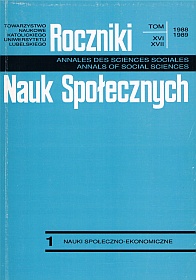Znaczenie i aktualność encykliki Jana XXIII "Pacem in terris"
Abstrakt
Recently, there have been two trends in the understanding of natural law in the Thomistic philosophy: a. general understanding - understanding of natural law in terms of main norms of
social life; b. making that law more particular - formulating concrete rights and duties, that is. It is in "Pacem in terris" that those two trends converge end are complementary to one another. In view of the dispute over the hierarchy of man’s social rights, it must be emphasized that John XXIII relates these rights to the right to live, which right he places on top of all others. It is characteristic that according to John XXIII in order to put, for instance, the right to just wages into practice, one has to take into consideration "the requirements of common good of all nations /.../ of different character and size". The Pope abandoned the subjective approach to the right to the freedom of conscience and religion, and emphasized its personal dimension. It is not truth that has a right but man has a right to the freedom of conscience.
The author proves that John XXIII is not satisfied with the so-called legal protection of man’s rights, he even exposed the extralegal protection: through the structure of an enterprise, international cooperation /L-M/ for the development of all nations and through democratic system. The universalism of man’s rights is not accompanied by universal protection, hence there is a need to establish world authorities. The author claims that the term "familia humana" used in "Pacem in terris" was adopted from Pius XII, but not from the Universal Declaration of Man’s Rights. He also thinks that John XXIII did not accept the 18th century conception of man’s rights but presented a Christian conception of man’s rights.
Copyright (c) 1989 Roczniki Nauk Społecznych

Utwór dostępny jest na licencji Creative Commons Uznanie autorstwa – Użycie niekomercyjne – Bez utworów zależnych 4.0 Międzynarodowe.


